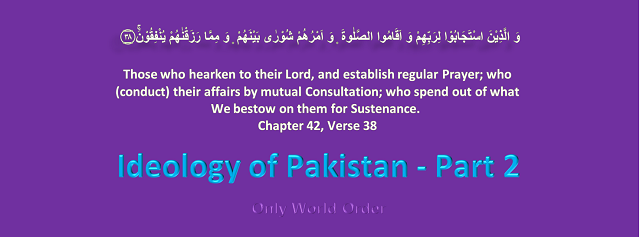Ideology of Pakistan Part 2/3 – Quranic Concept

His Supremacy Allah, however, is the Abstract, Transcendental Reality. How can we obey Him if we cannot contact Him? The answer is: by observing His laws (Quranic Concept) as given in His book. This is why the messenger was asked to declare (Chapter 6, Verse 114):
اَفَغَیْرَ اللّٰهِ اَبْتَغِیْ حَكَمًا وَّ هُوَ الَّذِیْۤ اَنْزَلَ اِلَیْكُمُ الْكِتٰبَ مُفَصَّلًا ؕ وَ الَّذِیْنَ اٰتَیْنٰهُمُ الْكِتٰبَ یَعْلَمُوْنَ اَنَّهٗ مُنَزَّلٌ مِّنْ رَّبِّكَ بِالْحَقِّ فَلَا تَكُوْنَنَّ مِنَ الْمُمْتَرِیْنَ۱۱۴
Translation:
Say: “Shall I seek for judge other than Allah? – when He it is Who hath sent unto you the Book, explained in detail.” They know full well, to whom We have given the Book, that it hath been sent down from thy Lord in truth. Never be then of those who doubt.
This book was the criterion to decide whether a State was Islamic or un-Islamic Says The Noble Quran (Chapter 5, Verse 44):
اِنَّاۤ اَنْزَلْنَا التَّوْرٰىةَ فِیْهَا هُدًی وَّ نُوْرٌ ۚ یَحْكُمُ بِهَا النَّبِیُّوْنَ الَّذِیْنَ اَسْلَمُوْا لِلَّذِیْنَ هَادُوْا وَ الرَّبّٰنِیُّوْنَ وَ الْاَحْبَارُ بِمَا اسْتُحْفِظُوْا مِنْ كِتٰبِ اللّٰهِ وَ كَانُوْا عَلَیْهِ شُهَدَآءَ ۚ فَلَا تَخْشَوُا النَّاسَ وَ اخْشَوْنِ وَ لَا تَشْتَرُوْا بِاٰیٰتِیْ ثَمَنًا قَلِیْلًا ؕ وَ مَنْ لَّمْ یَحْكُمْ بِمَاۤ اَنْزَلَ اللّٰهُ فَاُولٰٓىِٕكَ هُمُ الْكٰفِرُوْنَ۴۴
Translation:
It was We who revealed the law (to Moses): therein was guidance and light. By its standard have been judged the Jews, by the prophets who bowed (as in Islam) to Allah`s will, by the rabbis and the doctors of law: for to them was entrusted the protection of Allah`s book, and they were witnesses thereto: therefore fear not men, but fear me, and sell not my signs for a miserable price. If any do fail to judge by (the light of) what Allah hath revealed, they are (no better than) Unbelievers.
The laws, directives, principles and values given by The Noble Quran are complete, final, eternal and un-alterable. None, not even the entire Ummah (Nation) has the authority to add to, subtract from or make any alteration therein. But it does not prescribe details thereof. With the exception of a very few laws, it demarcates the boundary lines of what is lawful and what is unlawful. These lines no one has the right to transgress; not even the entire community. Within these lines, the Islamic State is free to frame such bye-laws as the needs of the time require. These bye-laws are, of course, subject to change and may be revised or even abrogated by the Ummah (Nation) by mutual consultation (Chapter 42, Verse 38):
وَ الَّذِیْنَ اسْتَجَابُوْا لِرَبِّهِمْ وَ اَقَامُوا الصَّلٰوةَ ۪ وَ اَمْرُهُمْ شُوْرٰی بَیْنَهُمْ ۪ وَ مِمَّا رَزَقْنٰهُمْ یُنْفِقُوْنَۚ۳۸
Translation:
Those who hearken to their Lord, and establish regular Prayer; who (conduct) their affairs by mutual Consultation; who spend out of what We bestow on them for Sustenance;
leaving the boundary lines untouched. This is where an Islamic State differs from the democracy of the West. According to Western democracy, the people have unbridled power to frame any laws, whereas, in the Islamic State, the consultative machinery of the Ummah (nation) can frame sub-laws only within the boundary lines framed by the Quran. Iqbal has beautifully narrated this unique feature of the Islamic State. He says in his lectures:
“The ultimate spiritual basis of all life, as conceived by Islam, is eternal and reveals itself in variety and change. A society based on such a conception of reality, must reconcile in its life the categories of permanence and change; it must possess eternal principles to regulate its collective life; for, the eternal gives us a foothold in the world of perpetual change. But eternal principles when they are understood to exclude all possibilities of change, which, according to Quran is one of the greatest signs of God, tend to immobilize what is essentially mobile in its nature.”
(Reconstruction of Religious Thoughts in Islam)
Iqbal has touched upon this very subtle, yet most important point with reference to political system of Islam, but it takes us far, far beyond political horizon. The fundamental principle of the reconciliation of the categories of permanence and change is not confined to the process of law-making. It is the very essence of Islam and can be appreciated only when the Quranic concept of human life is thoroughly grasped.
There are two concepts of human life – materialistic and Quranic. The materialistic outlook of life treats man as any other animal, whose only function is to develop and enlarge his physical existence. It functions under physical laws and is disintegrated and gets extinct with death. It is subject to perpetual change; every moment millions and millions of cells, which constitute human body, are destroyed and replaced by fresh cells. This process of constant change continues till death overtakes him and he ceases to live. Since, according to this concept of life, there is nothing permanent in human life, it stands in need of no “Permanent Values”, no unchangeable principles, no immutable boundary lines, and therefore, no necessity of Divine Guidance.
According to Quranic concept of life, on the other hand, human body, no doubt develops, flourishes, and eventually disintegrates, under physical laws, but there is something else in man besides his body, that is, his SELF or PERSONALITY, which is neither physical in its constitution nor is it subject to physical laws as such. It is endowed to every human child in like measure at his birth, but it is only in an undeveloped form. To develop it to its full maturity, and to give it a perfect and balanced shape is the goal of all human activities. Every act of his, performed in accordance with Permanent Values, contributes to its development, and whatever is done against these values, retards this process and weakens the Self. An act, it should be noted, includes thought, wish and desire, as well.
The Self or Personality thus developed easily sustains the shock of death and survives the disintegration and dissolution of physical body, and goes on developing further, passing through more evolutionary stages, which we call “Hereafter” or the life after death. The fact that, not only the actual deeds of a human being but his thoughts, wishes and desires as well, act upon human Personality, is what is called the “Law of Retribution” which is as inexorable and immutable as the Laws of Nature.
It is the human personality which takes decisions, but at the present level of existence, its decisions are implemented through physical body. For this purpose, it is essential that human body should also develop and be in a position to carry out the commands of the Personality. For its development, the needs and requirements of human body will change from time to time, whereas human personality, while developing shall remain un-changed. The renowned Polish thinker, Nikolai Berdyaev, has beautifully concentrated this in four words, by saying:
“Personality is changelessness in change”
(Slavery and Freedom – Page 8)
The process of the development of human body and personality can take place only in Islamic Social Order (or Deen, as already explained). This order / system provides to each and every individual means for the development of both. It will be seen that this system differs basically from all other systems.
Reverting to the principle law-making, Iqbal examined critically what had been going on in our past history, and in one of his lecture he said that:
“The teaching of the Quran that life is a process of progressive creation necessitates that each generation, guided but unhampered by the work of its predecessors, whould be permitted to solve its own problems.”
It follows, therefore, that the general notion that the laws made by our earlier jurists and promulgated in the past are eternal and binding on all future generations, is against the basic teachings of The Noble Quran. This was thoroughly explained by Iqbal in his “Sixth lecture”, entitled “The principles of movement in the structure of Islam” in which he says:
“The question which is likely to confront Muslim countries in the near future is whether the Law of Islam is capable of evolution – a question which will require great intellectual effort, and is sure to be answered in the affirmative; provided the world of Islam approaches it in the spirit of the 2nd Caliph Omar (as Allah pleased with him), the first critical and independent mind in Islam who, at the last moments of His Excellency Muhammed (peace be upon him), had the moral courage to utter these remarkable words: (The Book of God is sufficient for us).”
Iqbal accomplished his task and, handing over the torch to Mr. Muhammed Ali Jinnah (The Founder of Pakistan), and passed away. Mr. Jinnah also known as Quaid-e-Azam, during his struggle for the achievement of Pakistan, reiterated the main features of the proposed Islamic State, as enunciated by Iqbal. No doubt the British and the Hindus opposed tooth and nail the proposal for the establishment of a separate State for the Muslims, but its main opponents were the so called “Nationalist Ulemas” who were the custodians of religion (Mazhab), as already explained. Plainly speaking, the struggle for Pakistan was, in reality, struggle between Deen and Mazhab. This struggle was started during the life time of Iqbal himself. For want of adequate space, it is not possible to quote extensively from the speeches and writings of Quaid-e-Azam, on the subject. It would suffice if some of the more important points were cited.
It is generally said, that it was the narrow-mindedness of the Hindus and their maltreatment and fanatical prejudice toward the Muslims which compelled the latter to seek protection in a separate homeland, and thus the demand for Pakistan. This is not only distortion of history but also malicious propaganda. The Ideology of Pakistan was explained by Iqbal in the Presidential address at Allahabad in 1930. Pakistan Resolution was passed in the Annual Session of the All-India Muslim League, at Lahore in 1940. Quaid-e-Azam said in his Presidential address:
“It is extremely difficult to appreciate why our Hindu friends fail to understand the real nature of Islam and Hinduism. They are not religions in the strict sense of the word, but are, in fact, different and distinct social orders, and it is a dream that the Hindus and Muslims can ever evolve a common nationality, and this conception of one Indian nation has gone far beyond the limits and is the cause of most of your troubles and will lead India to destruction if we fail to revise our notions in time.
The Hindus and Muslims belong to two different religions, philosophies, social customs, literatures. They neither intermarry nor interdine together, and, indeed, they belong to two different civilizations which are based mainly on conflicting ideas and conceptions. Their aspects on life and of life are different.” In his speech at the Frontier Muslim League Conference on November 21, 1945, he said:
